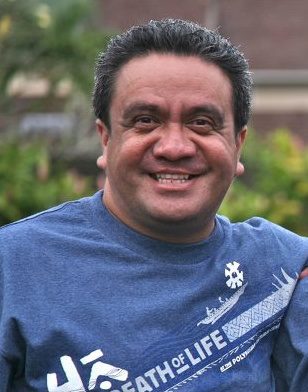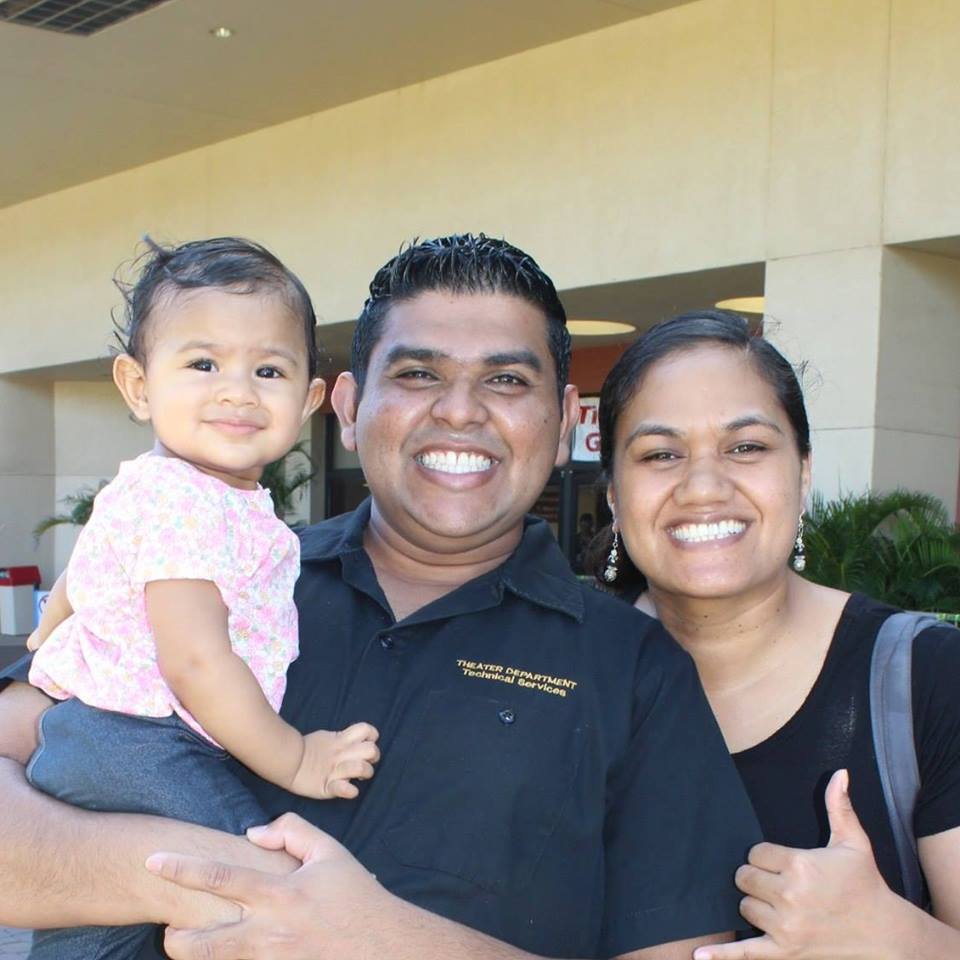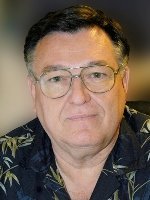Welcome to our two new managers
Following the recent retirement — or “graduation,” as we like to say around here — of Aunty Ellen Gay Dela Rosa, PCC Vice President of Cultural Presentations Delsa Moe reorganized our Theater Department under two newly promoted managers:
 David Tiave has been named Senior Theater Manager: David Tiave is a Honolulu-born Samoan who grew up in Kalihi. He used to come to Laie a lot because he has family here. “I was blown away as a little kid,” he recalled. “Two of my older siblings worked in the evening show, and we also used to come a lot with the PCC’s School Junior Guide program.”
David Tiave has been named Senior Theater Manager: David Tiave is a Honolulu-born Samoan who grew up in Kalihi. He used to come to Laie a lot because he has family here. “I was blown away as a little kid,” he recalled. “Two of my older siblings worked in the evening show, and we also used to come a lot with the PCC’s School Junior Guide program.”
“I remember in 1983 coming when they first previewed This is Polynesia. That was the night show where I got the feeling that I wanted to work here, too,” he said.
Today, following his own successful years of performing and working his way up through management, Tiave is the PCC Senior Theater Manager who oversees more than 200 employees in the evening show, canoe pageant, luau productions, promo team and theater ushers; but like some success stories, it wasn’t always easy.
Right after graduating from Farrington High School in 1985, Tiave enrolled at BYU–Hawaii and got his first job in Food Services bussing dishes. He recalls he would pack his dinner from the Gateway and use it to bribe theater ushers so he could watch the evening show and learn the various dance routines; but even so, he flunked his first three cast auditions.
The fourth audition was a charm, however, and Tiave started working in the Maori section under Uncle Tommy Taurima. “Within three months I actually became one of the Maori leads, when Uncle Tommy left. That was hard and I was really young, but they respected me. I tried to do what Uncle Tommy had taught us, and just maintain the section until they hired the late Aunty Nihipora Wallace. She was the best, and it was really nice working with her.”
Over the years Tiave learned all of the other dances, to the point where he got his first fulltime job at PCC in 1991 as a Promo Team dancer. He traveled a lot, listing trips to Japan, China, Australia, Germany, Colombia, Panama, Ecuador, Costa Rica “and all over the United States. China was my favorite because we not only represented the Cultural Center, but all of Polynesia and the Latter-day Saint Church as well while seeing all these other countries performing with us. We were proud, especially when we saw how others appreciated our culture.”
Tiave first joined management in 1993 as the Stage Manager for the canoe pageant and the luau shows, and from there he served as the Artist and Repertoire Manager. Then, following a time in the Marquesas Village as a demonstrator and guide, he rejoined the Promo Team as a Production Manager. “The Promo Team was eventually reorganized into the Theater Department again, and we’ve been there since then,” he said.
Before his current promotion, Tiave served as the PCC Creative Performance Manager in the Theater Department, which meant working with section leaders and critiquing the show every night — a challenging position.
“We’re always managing manpower, due to turnover and conflicts with school. For example, many of the juniors and senior students have to do internships on campus. You’ve got to remember, they’re not with us for long. Very few start off perfect, and stay all the way; but I can’t think of any other job I would like more. I thought putting Hā together in 2009 was hard, but it was also great working with so many talented people. Now it’s even harder to maintain the ongoing quality as new cast members continually come in.”
“Here I am more than 25 years later: I’ve still got that desire to work here. I’m so lucky, because every day I get to walk out on that stage. I look at all the little things that moved me when I first came here. Sometimes I sit in the same seat where I sat as a kid to watch the show. There’s still a lot I need to learn, but this is the perfect job for me.”
“I also really appreciate all the leaders I worked under. They are amazing people: Delsa Moe, Sione Pasi, the late Uncle Raymond Mariteragi and Aunty Ellen Gay Dela Rosa. She has left the biggest shoes to fill, and to be honest, I didn’t think they would ask me. I was shocked.”
“One of the things I’ve enjoyed most is watching all these young men and women coming here for school, and seeing how much they’ve improved when they graduate. I also like seeing the audience’s reactions. I’m not talking about standing ovations, which we often get, but for example seeing a husband holding his wife closer after Hā. For me, that’s priceless.”
 Richard Sidal heads PCC Theater areas: Richard Sidal is now the Polynesian Cultural Center’s Theater Production Manager. In his new position, the Fijian-Indian from the small island of Taveuni in Fiji, oversees approximately 50 employees working in the Center’s lighting, sound, stage and props, theater office, and the Hawaiian Journey Theater areas.
Richard Sidal heads PCC Theater areas: Richard Sidal is now the Polynesian Cultural Center’s Theater Production Manager. In his new position, the Fijian-Indian from the small island of Taveuni in Fiji, oversees approximately 50 employees working in the Center’s lighting, sound, stage and props, theater office, and the Hawaiian Journey Theater areas.
Sidal, who had never touched a computer before he graduated from high school back in Fiji, came to BYU–Hawaii in 2006 and got his first PCC student job in the Food and Beverage Warehouse. After serving a Latter-day Saint proselyting mission in the Ogden, Utah area, he returned to Laie, started working as a Theater Spotlight Operator, and switched his major to IT — informational technology and networking. Upon graduating, the PCC immediately hired him fulltime; and he most recently served as the Theater Computer Systems Analyst for the show’s lighting controls.
“I don’t think most people realize how much the Center has invested in our Theater technology,” Sidal said, noting that the PCC has millions of dollars of “top of the line, high-tech equipment. Everything has been computerized that can be computerized. My IT background and experience was a great help in getting me the job.”
For example, after visiting professional theaters in Honolulu, Las Vegas and Disneyland, Sidal said, “our equipment is the best you can find in any market. We have the same equipment that’s being run in Disneyland, and we have the best equipment for outdoor venues.”
Sidal also said that even as a manager, “I still spend quite a bit of time changing computer programs and helping shift lights.” For example, several evening show sections have recently made timing changes, which required subsequent lighting changes. “We build from cue by cue, changing the lights — each of which has a unique IP ‘address,’ like a phone number — from one scene to another and another, so the lights are pre-set and ready before they come on. If not, guests would see a bunch of lights moving when the show reached a certain cue.”
“One of the biggest challenges right now is helping see there’s a better way of doing things. There are still things we can do more efficiently,” Sidal continued. “Cutting power consumption is another important objective. The equipment might initially cost more, but we’ll save in the long run. Two years ago, for example, we took out 160 1,000-watt lamps, and we replaced them with LED [low-power light-emitting diode] lights that only use 100 watts each. That resulted in about a 95% savings in energy. Perceptually, guests can see the effects better because they also have a better color spectrum.”
But Sidal said that “working with the students is my favorite part of the job, because I was a student here, too. We have students from all different backgrounds and experience levels. A lot of them start from scratch skill-wise; whereas the sound crew guys, who are dealing with live wires, usually come from the community and already have experience. Our students have a wonderful opportunity to work with them, learning trade skills in a mentoring relationship.”
“I know they all have their struggles and hard times in school and in their families,” he continued, “but seeing them all work together with a desire to learn, is always amazing to me. Once these employees have the spirit of wanting to do better it rubs off on others. Even the guests feel it, and I really enjoy seeing them grow.”
“One student from Malaysia who graduates in February 2017, for example, has already had job offers back home. He is also one of our supervisors, and that carried a lot of weight on his résumé. He also listed the brand names of the equipment he can operate, that are known worldwide. Tentative employers were happy with his résumé. The same is happening with other students.”
“We’re one big family here, just like our saying goes, ‘one ohana sharing aloha,’” said the young man from Taveuni. “My original goal was to go back to the place that I come from, but working here at the Center I am now able to help students not only from my own country, but from many other countries” — all while overseeing the Center’s complex, multi-million-dollar theater technology.
For more PCC October 2016 news, CLICK HERE
Story and images by Mike Foley
 Mike Foley, who has worked off-and-on
Mike Foley, who has worked off-and-on
at the Polynesian Cultural Center since
1968, has been a full-time freelance
writer and digital media specialist since
2002, and had a long career in marketing
communications and PR before that. He
learned to speak fluent Samoan as a
Mormon missionary before moving to Laie
in 1967 — still does, and he has traveled
extensively over the years throughout
Polynesia and other Pacific islands. Foley
is mostly retired now, but continues to
contribute to various PCC and other media.

Recent Comments